
Let's Talk
Menu

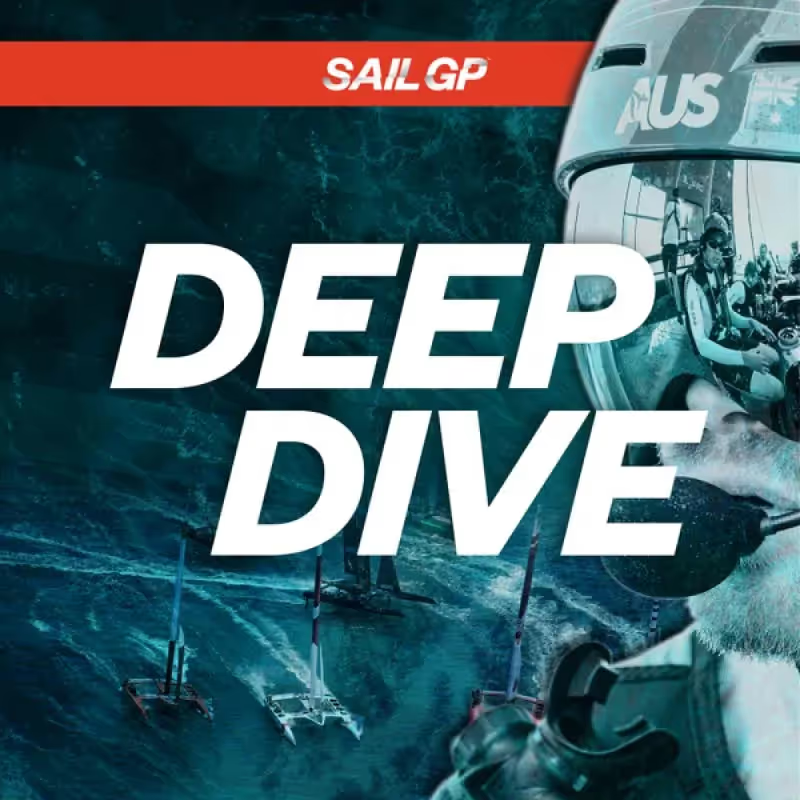

As the podcasting space continues to expand and evolve, the demand for sports-based shows grows at a dramatic pace. In fact, sports is one of the most in-demand podcasting genres out there - specifically, the 5th most popular in the US (according to this study by Edison Research).
And it’s not surprising that the two go so well together. Especially when you examine the characteristics of the average podcast listener, and the average sports fan. Both very loyal, both incredibly engaged, and both extremely passionate.
Sports podcasts aren’t just coming from the major leagues or clubs, either. They’re also coming from the athletes themselves, the sports enthusiasts, and the fans. All with one common goal - to let listeners experience sports in new ways. To give them something more than the usual 90 minutes, or 12 rounds. To share personal insight and expertise. To harbour excitement, and to fuel passion. The list could go on.
To put the value of sports podcasting into perspective, and to show you just how big of a deal it is, Spotify recently bought The Ringer (a sports-podcast network created by sports writer, Bill Simmons) for $250million. It’s a staggering figure. And a ground-breaking acquisition which led Daniel Ek (co-founder and CEO of Spotify) to state his streaming platform was turning into “the new ESPN.”
Basically, sports podcasting is a worthwhile investment for any sports brand wanting to drive growth, acquire new fans, sell more products, or make more money. But why? And, how? More on this later.
We’ll go into how the sports industry can benefit from podcasting shortly. But before we do that, let us introduce a client we’re currently working with to produce an industry-leading sports podcast.
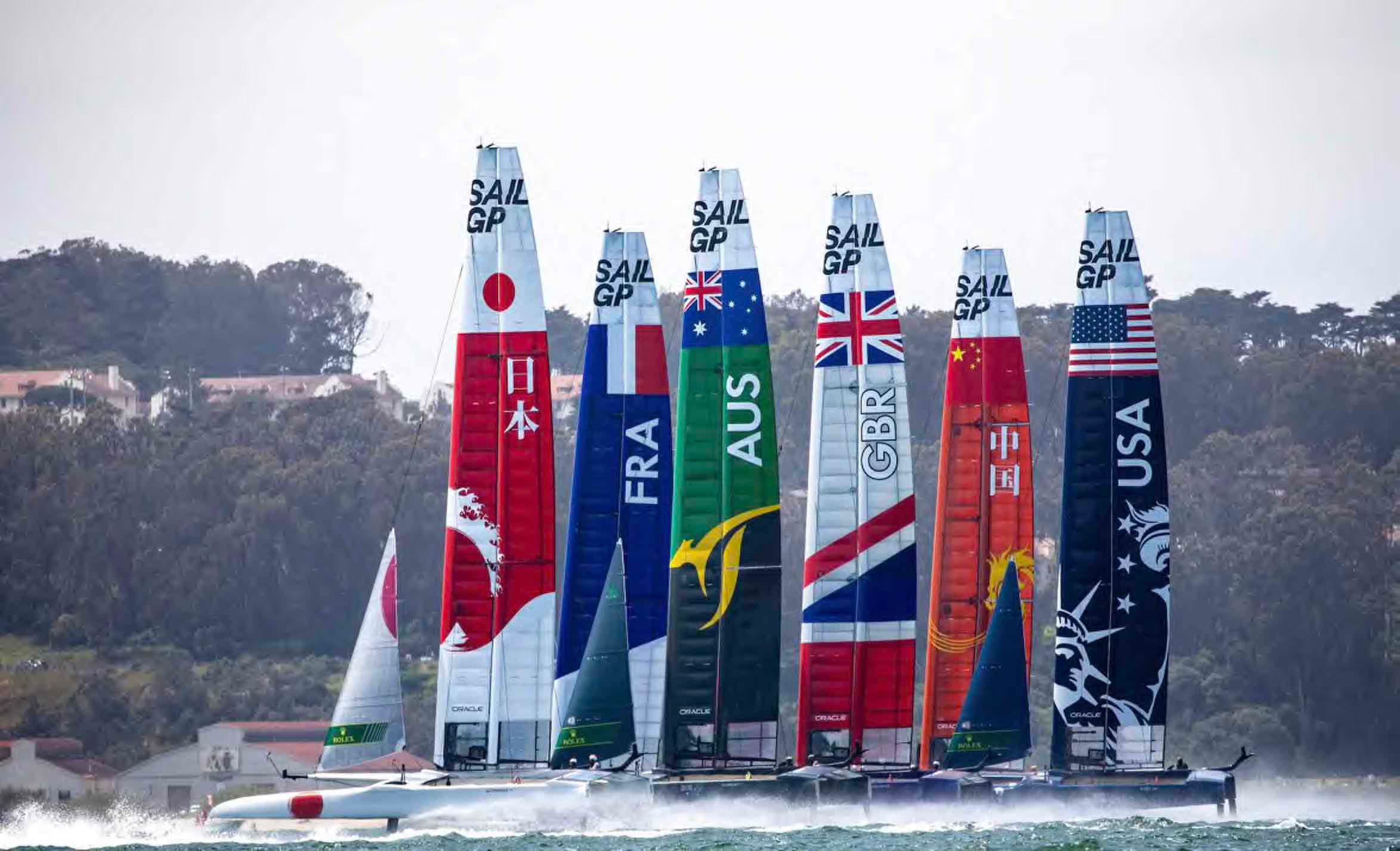
SailGP (otherwise known as ‘the global sailing league’) is a year long, adrenaline-fuelled racing event that takes place across multiple destinations around the world. We’re talking nine teams, eleven races, and eleven locations including the UK, the US, Australia, Singapore, Bermuda, Dubai, and more. All for a winner-takes-all, $1,000,000 prize fund.
So before they headed into their third season in early 2022, the brand partnerships team at Cue reached out to the event’s organisers about starting a sports podcast. One that would take fans behind the scenes of the event. And in 2021, we officially joined forces to fully plan, produce, and distribute their show. Below is a quick rundown of the project:
Taking the above brief into account, we produced Deep Dive. A sports-punditry podcast giving die-hard fans of the sport exclusive insight & access to the 2022/23 Global Sailing Grand Prix. The show is hosted by two sailing legends, Stevie Morrison and David ‘Freddie’ Carr. Episodes are jam-packed with race predictions, on and off-water drama, driver interviews, performance reviews, result breakdowns, and more.

To listen to the podcast, just click the audio player at the top of the page.
Note: We’ll be referencing Deep Dive throughout the following article. The aim is to use first-hand examples demonstrating how the sports industry can benefit from podcasting.
A sports podcast is one which focuses on the sports industry, and its athletes. Shows typically cover sporting events, industry news, results or predictions, debates, discussions, behind-the-scenes insight, and interviews with leading sports figures.
Before we look at whether a sports podcast is the right fit for your brand, team, or event, it’s important to recognise how podcasting can benefit the sports industry overall. We’ve rounded it up into 13 main points below.
The sports industry has a current estimated worth of $600bn-$700bn. It’s an eye-watering figure. And although you might be tempted to say it gets enough exposure already, you’d be wrong in the eyes of the millions of sports fans who just can’t get enough of their favourite teams, leagues, or athletes. Especially in the age of social media, when there’s a greater need for exposure than ever before.
To get to the point, podcasting is just another form of media for sports to take advantage of. It’s another way to engage with fans. A different platform to win new listeners on.
When we first released Deep Dive, we issued a press release to multiple publications and journalists. Not only did this promote the podcast, but it also promoted the sports industry, and the sport itself to readers outside its own following. You can see this in action below:
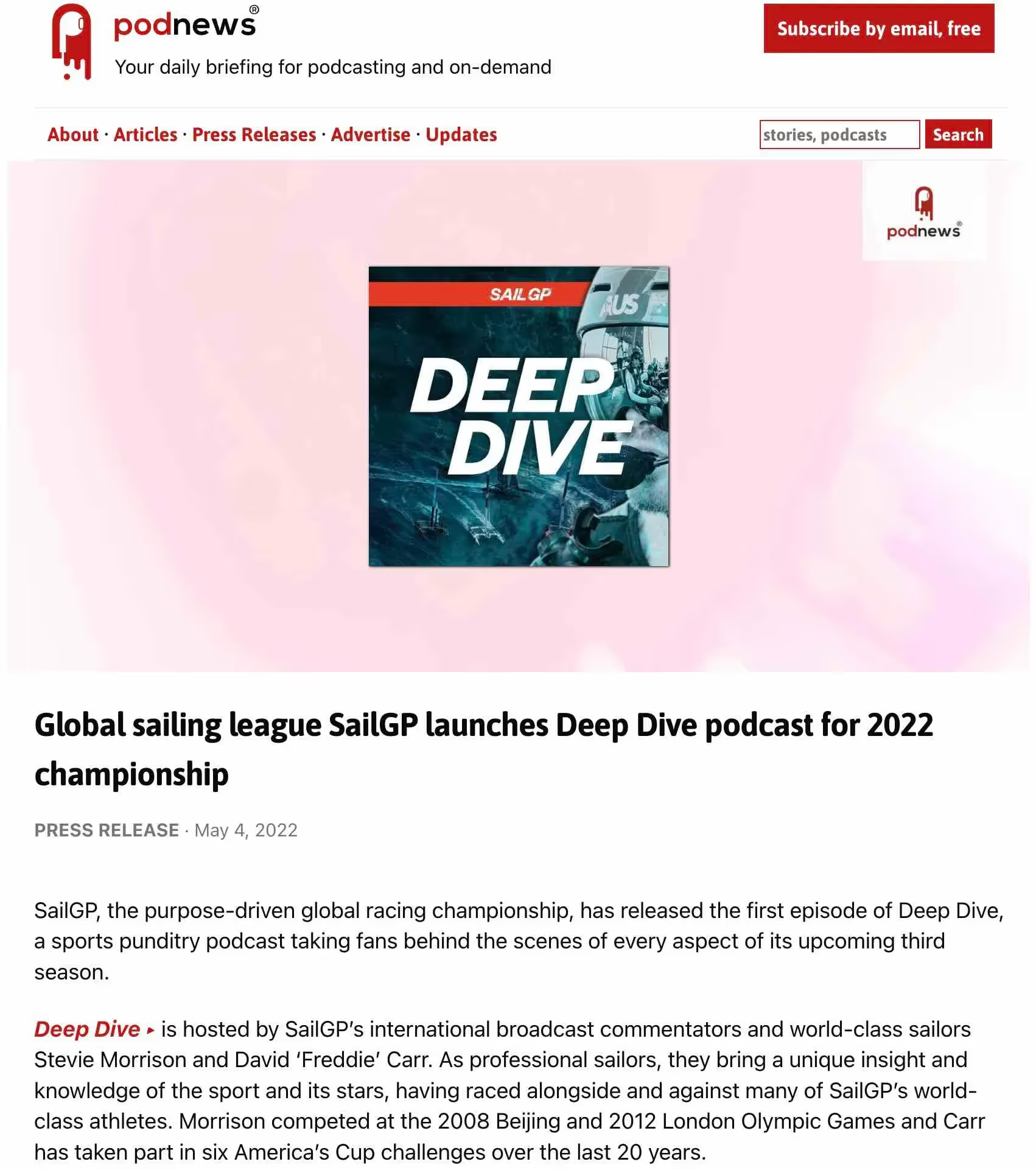
To read the full statement, click here.
Note: A press release won’t be appropriate for all sports podcasts. They’re typically worthwhile for shows produced by established brands with already existent fan followings.
This one’s simple, but important. Starting a sports podcast gives teams and athletes a platform to connect with existing fans on a deeper level, resulting in stronger connections. And the more engaged a community, the better. Podcasts are also a really intimate form of media. Audio has an added texture that allows emotions to be expressed more - making them more personal, relatable, and engaging than other outlets.
Podcasts in general are often used as safe spaces, where the host (or guests) can talk about whatever they want. They can elaborate more on specific topics, which their professional roles may not allow for. Translating this to sports, athletes might use podcasts to share personal opinions. They might share insight into their lives. If fans feel like they know the person talking better, it’ll lead to much tighter connections.
Because podcasts are so accessible, reaching a wider pool of potential sports fans is easy. The pure nature of podcasting means listeners can tune into shows from anywhere around the world, making them the perfect tool for reaching new audiences. Once an audio file has been uploaded and pushed live, there are few geographical limits on where it can be listened to.
And whilst all sports can use this to their advantage, it’s especially appealing for the ones that get less mainstream coverage. Like sailing, for example. Gone are the days of having to rely on the main media outlets for promotion. With podcasting, lesser-known sports can essentially take this into their own hands.
Note: SailGP’s Deep Dive receives 2-3k downloads worldwide, per episode.
Most athletes will likely already have their own social media channels. They might use their feeds to post personal photos, promote products (common with well-known athletes), or something else. But this type of content is short form, and in reality, it doesn’t give the loyal follower much to go on. That being said, there’s often a management team behind the account. And it’s their job to build a personal brand around the client.
Enter podcasting. It’s a much longer form of content, so it’s naturally a better method of building a personal brand. Because getting into the ears of fans for multiple, hour-long episodes will have a better payoff than a few static images will. The host will have an enhanced opportunity to showcase their area of expertise, earn trust, establish themselves as a leader in their field, and pitch themselves as a household name.

Hosted by former footballer, Peter Crouch, the That Peter Crouch Podcast is a prime example of how athletes can build their personal brands through podcasting. Swapping the pitch for the pub, Crouch uses episodes to show fans his real personality, truth, and expertise on football. Each instalment is a chance for fans to get to know him better, with each one consistently achieving 100k+ downloads. Check out an episode below:
Following on from the above point. Once an athlete (or industry figure) has successfully built their personal brand, they’ll have more opportunities to work with sponsors and carry out brand work. And the more athletes and sports figures you have doing this extra work, the more exposure the industry is getting as a whole. It’s a win-win-win. The athlete gets a bigger payday, the industry gets recognition, and the fan gets more content.
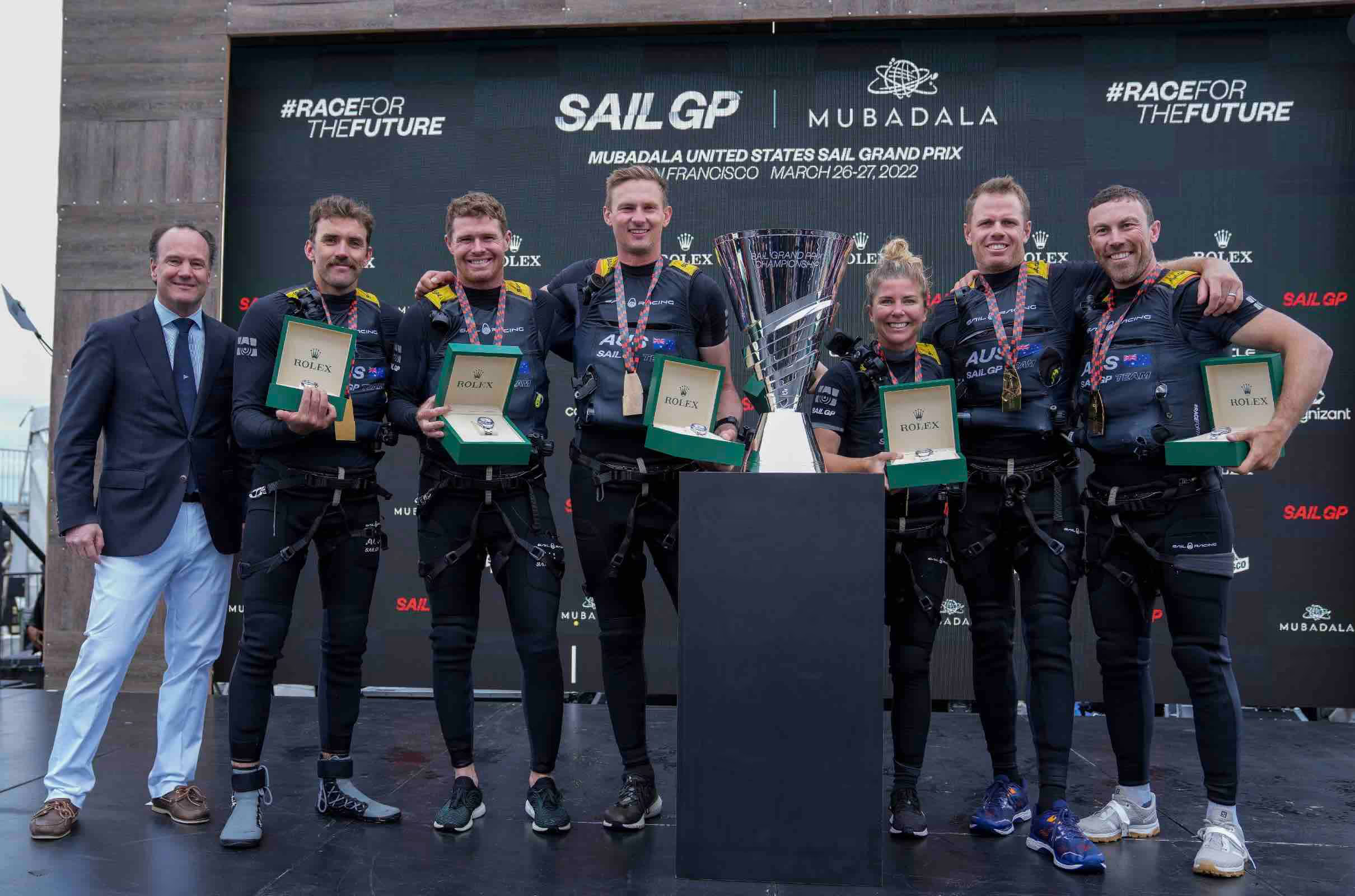
Note: It goes without saying that high-profile sports figures will receive bigger fees (often in the six-figure region) than less-known ones. This emphasises the value and worth in personal brand-building.
The status of a sport plays a huge role in which brands want to partner with it. Take The Premier League for example - it’s popular worldwide, it’s got a famously-loyal following, and the mainstream media covers every detail of each season. Because of this, tons of big brands like EA Sports, Barclays, Nike, Budweiser, and more naturally want to get involved.
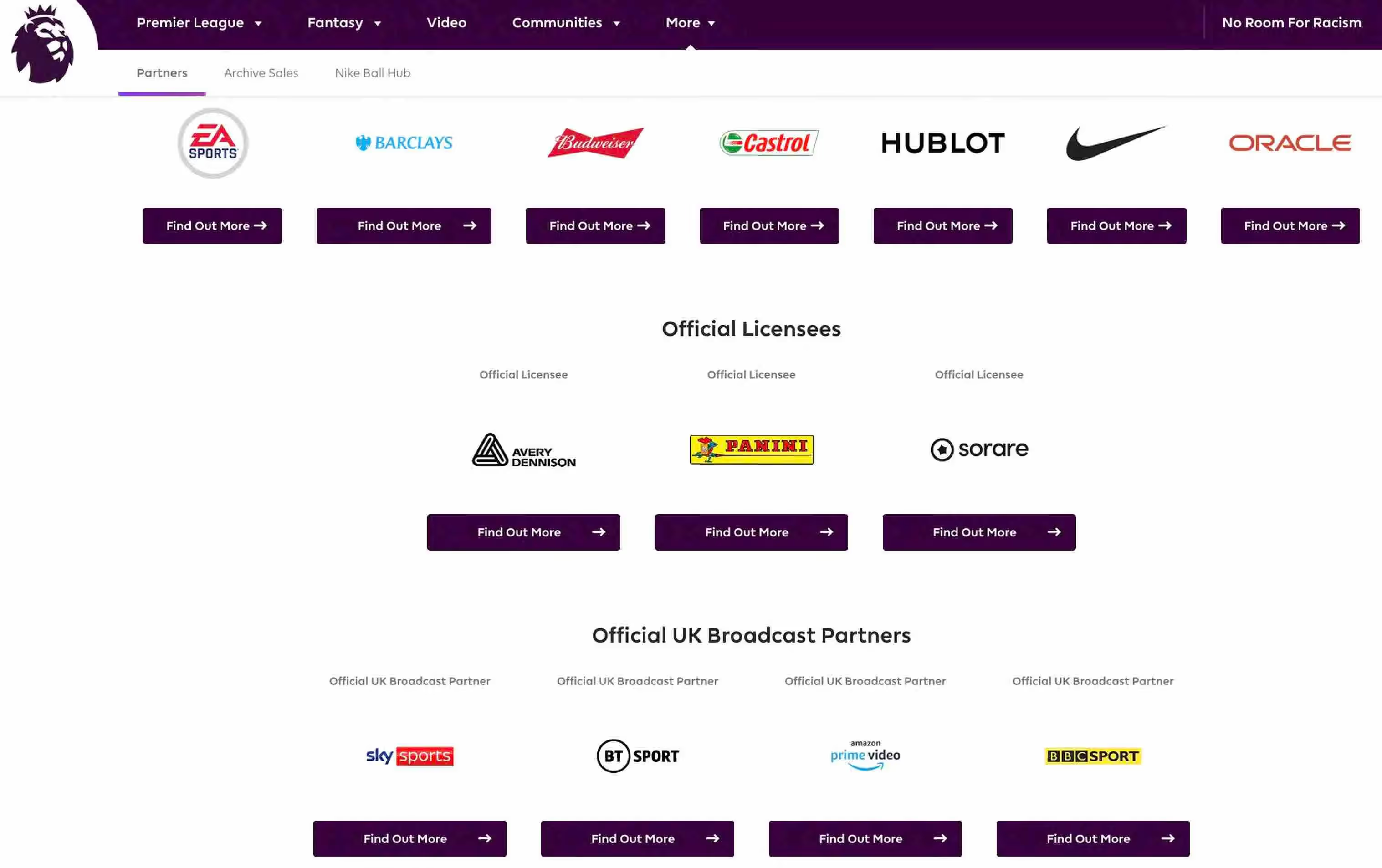
Sailing, on the other hand, isn’t as well known. Its followers are more niche, it’s not as popular as football, and it doesn’t frequent the media as much. As a result, fewer brands gravitate towards sponsoring it.
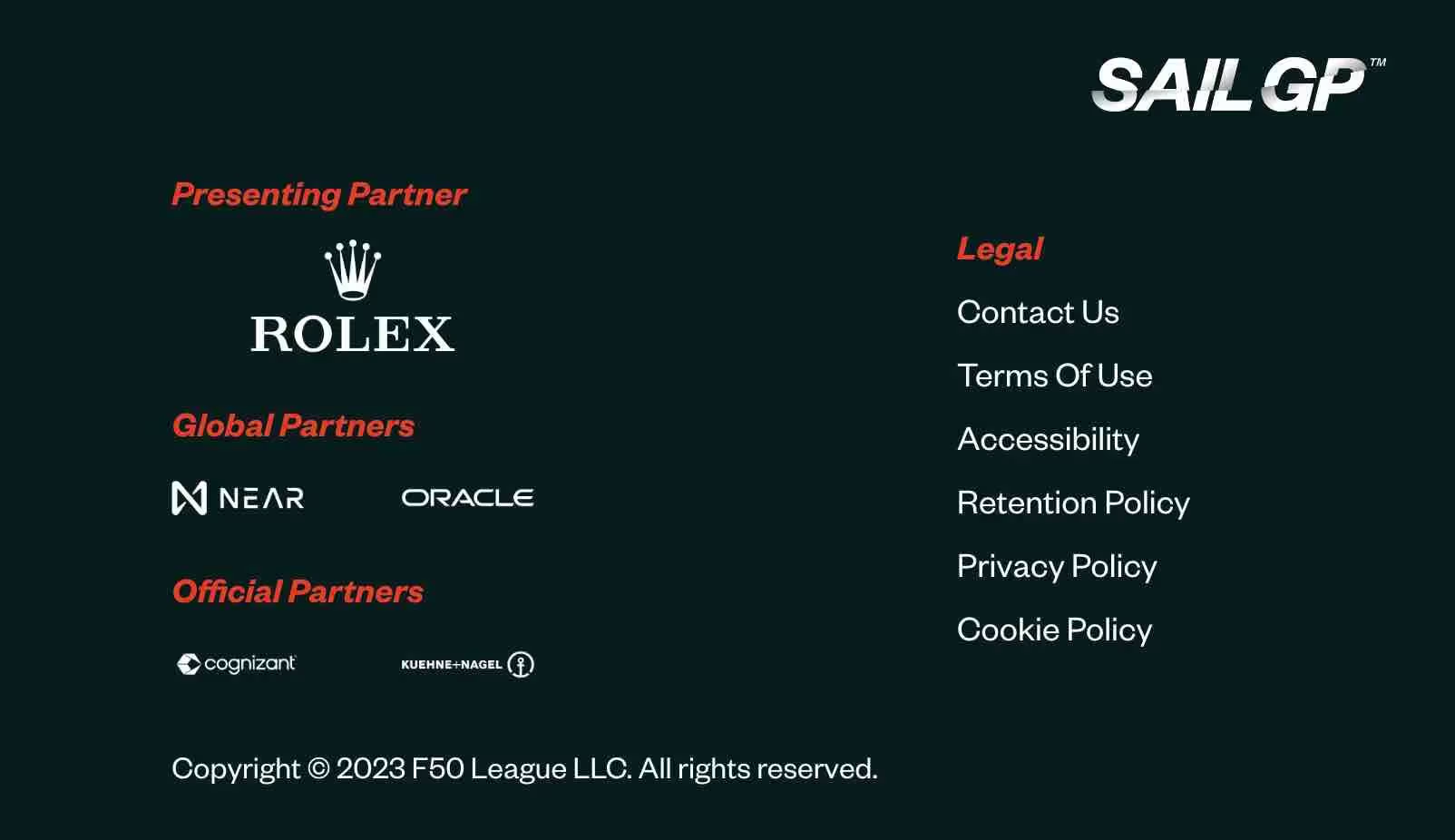
The point being that podcasting can massively impact the status of a sport. And if a high-performing sports podcast can drive enough traffic to it, the increased attention can absolutely lead to bigger (and more) brand partners.
Promoting a sporting event can be time consuming and costly. But if organisers don’t have hours and hours to spend building and executing a marketing plan, the good news is that a sports podcast is relatively easy to make. They’ll only really need a microphone, a recorder, and a concept to get going. This means they’re pretty cheap to set up too, and once the initial investments in the right equipment has been made, the running costs will stay quite low.
Podcast hosts should never underestimate the power of word-of-mouth promotion. So, to simply tell their audience about an event. At the end of each Deep Dive episode, the hosts will promote the next leg of the race - much easier and less costly than other marketing strategies. Here’s how they typically close the last few seconds of each episode:
SailGP will return to the iconic waters of [specify location] on [specify date], for the [specify race number] event of SailGP’s season 3. Make sure you tune in to watch the coverage live on YouTube, or better yet, grab yourself a ticket and get down to experience the spectacle live.
Once any sports podcast starts to gain some traction and popularity, there’s the potential for the brand to monetise it. This might be through sponsorships, cross-promotion, running ads, or affiliate marketing. If brands can deliver engaging content on a regular basis to a loyal audience, they’ll increase their chances of monetising episodes.
It’s worth noting here the potential in podcast ad revenue for the sports industry. As you can see from the below graph, the Interactive Advertising Bureau’s (IAB) annual report found that the total podcast ad revenue spend (across all genres) has been growing exponentially since 2015.
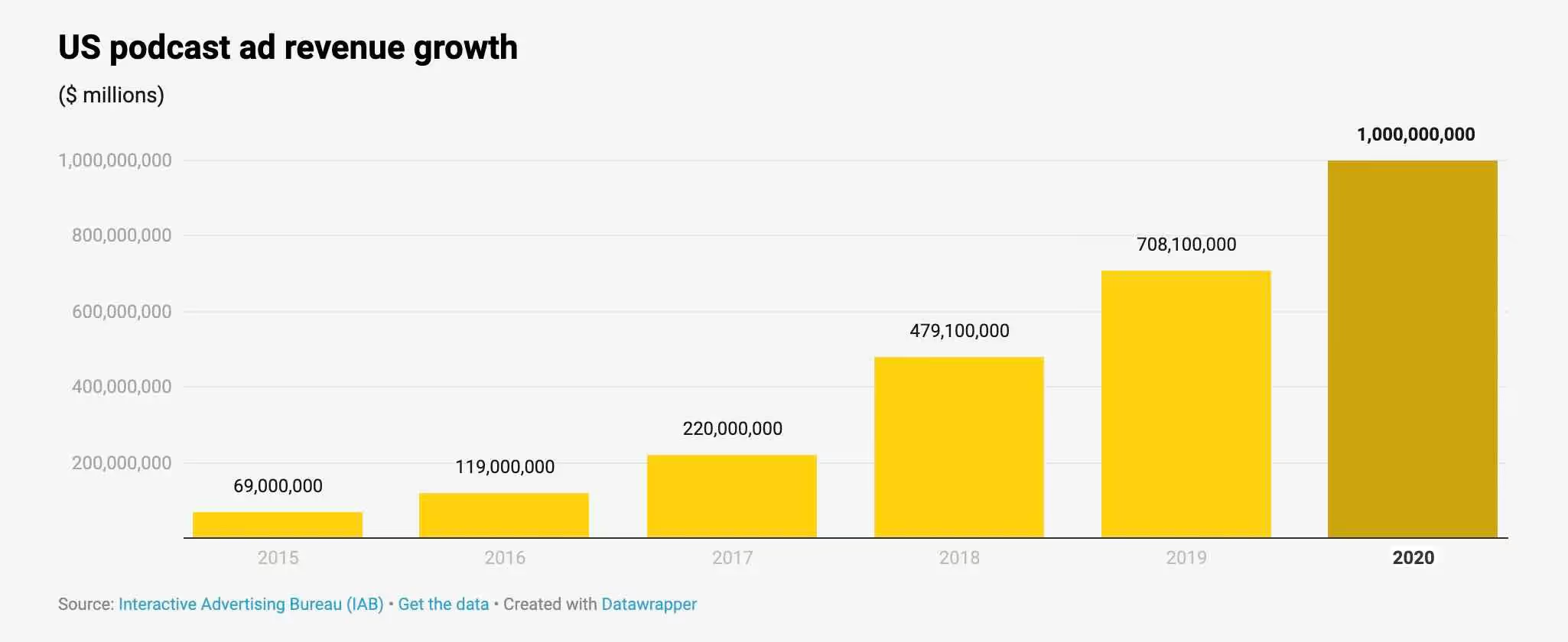
But despite the healthy figures, the report also found that sports podcasts make up just 8% of it. You can see this below:

Surprising? Well, not really. Because many of the major sports podcasts tend to stay ad-free. This is because they’re often used as promotional tools for the media outlet’s other services, rather than money-making opportunities. The BBC’s Rugby Union Daily is a prime example of this - so, rather than working with other brands, episodes highlight other shows inside the BBC network. Check out an episode below:
As you heard, the episode solely promotes Different, with Nicky Campbell - a BBC production. Not everyone’s the BBC, though. And not everyone has a slate of other shows or in-house services to promote. This means that smaller (albeit well-performing), independent sports podcasts will better suit monetising their episodes through external ad work.
For any loyal sports fan, their love of the industry reaches way beyond the actual event. Their passion doesn’t just die when the referee blows the whistle, for example. Or, when the judge declares the winner. It goes home with them where they crave additional, behind-the-scenes content. It’s easy to create this type of content with a sports podcast, and doing so can be a great alternative to a show going silent during an off-season. It’s good to keep momentum, and consistent posting is one of the keys to success.
The type of content a show might decide to produce during an off-season is entirely subjective. But to give you an idea, we’ve included some concepts below:
Before the third season of SailGP officially kicked off, Deep Dive released two off-season episodes introducing the race ahead. They included pre-season coverage, behind-the-scenes content, team analysis, host predictions, and event teasers. Check them out below:
We’ve talked a lot about sports podcasts hosted by athletes, or by leading industry figures. But in reality, many are hosted by the fans themselves. And interestingly enough, the big sports clubs are more than happy for them to do so, and won’t claim for copyright infringements. This is because they understand the value in fan-led content, and its engaged audiences. These types of shows often review events, give commentary, discuss relevant athletes, offer personal opinion, and more.
Some of these fan-led sports podcasts do exceptionally well. And some of them actually manage to grab the attention of the professionals, bridging the gap between the sporting elite and the casual fan. This interaction and acknowledgement is a valuable asset for the industry, as it builds community.
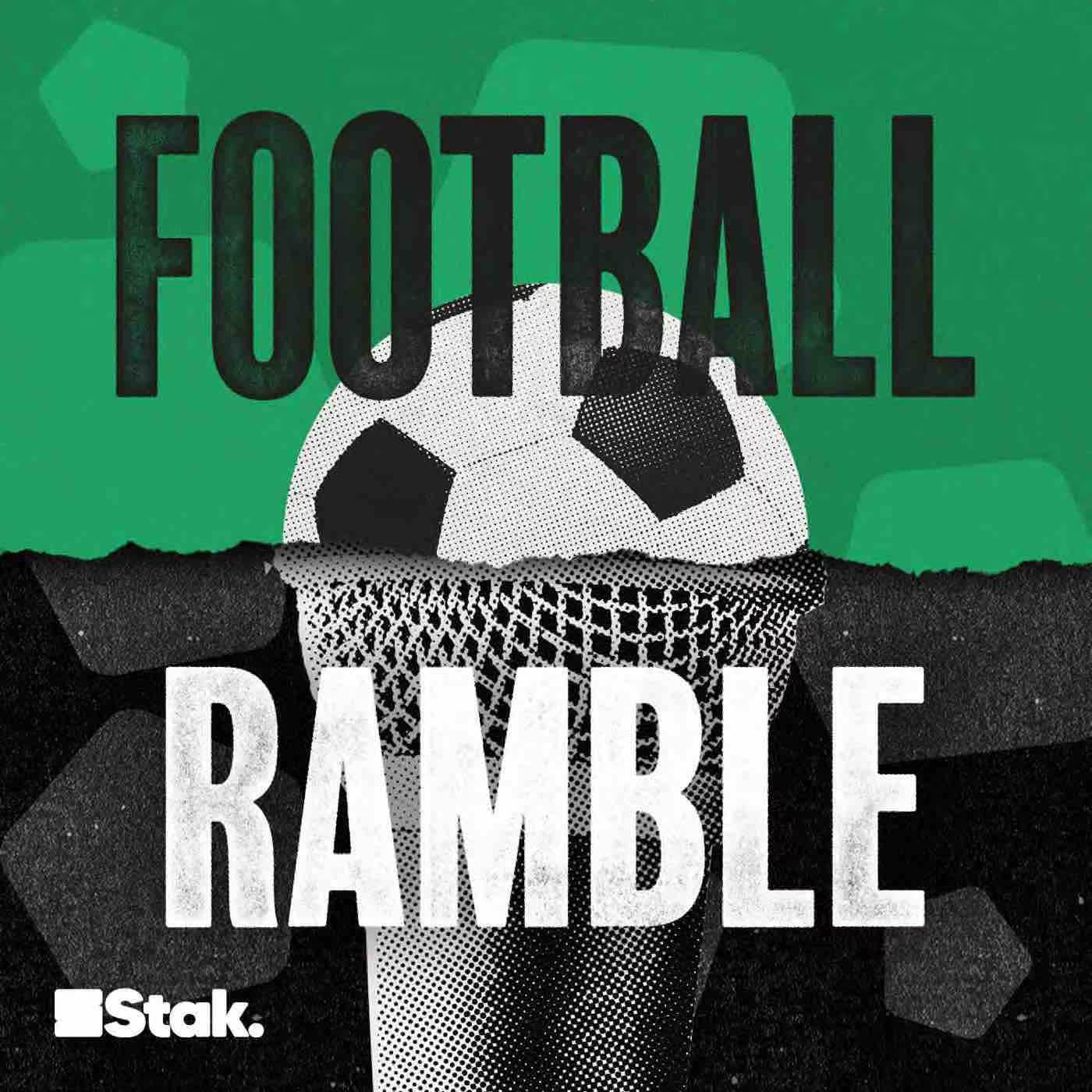
Hosted by four friends united by a passion for football, Football Ramble reviews every aspect of The Premier League. Episodes also discuss the biggest stories happening in the sport, the players, their own opinions, and the fundamentals of the game. The show is a firm favourite amongst football fans, and through consistent fan-led content, they’ve managed to build a loyal following consisting of 10k+ YouTube subscribers.
Audio content currently offers better cut-through than other media. There are 600 million blogs, 51 million YouTube channels, but only 4 million podcasts.
By looking at those figures, the natural instinct would be to assume podcasting as the least effective marketing strategy. It’s the smallest sector, after all. Well, podcast listeners are statistically more likely to buy something off the back of an in-episode advert, than regular TV or radio listeners are. And when you look at the big companies wanting to invest in digital marketing, they see sports podcasts as the most reliable format. The reasons for this can be narrowed down into a few points:
In fact, Spotify’s own research (conducted in 2019) found that:
81% of listeners took action after hearing host-read ads during a podcast — anything from looking up a product online, to connecting with a brand on social media, to talking about a product with someone.
They also found that:
52% of podcast listeners trust advertising more if the podcast host endorses the brand.
You can read the full report here.
With the above in mind, it would be foolish for the sports industry to not utilise podcasting as a marketing tool - whether it’s event promotion, selling a new product, or something else. We know sports fans are active and engaged, making them the perfect audience to advertise to.
A significant perk of podcasting is that episodes are incredibly easy for people to download and listen to, from wherever they are. Meaning they don’t have to be tied to a computer screen to engage. They can be out running errands, doing the school run, or simply on a walk. There’s next to no effort in listening to an episode of a podcast, and once downloaded, it can be replayed at any time. This increases listener retention, and means listeners are less likely to skip ads. Plus, anyone who subscribes to a podcast will get the latest episodes automatically downloaded onto their devices.
Repurposing an episode of a sports podcast into other formats is crucial for driving industry engagement. Not only that, but doing so means brands and events can share their messages on multiple platforms. Again, creating more exposure. Plus, it’s always good for podcasts to flesh out their content strategies and get maximum mileage out of every episode they release. To give you an idea, podcast episodes can be converted into some of the formats below:
Below is an example of how we lifted quotes from episodes of Deep Dive to create engaging and enticing social posts:
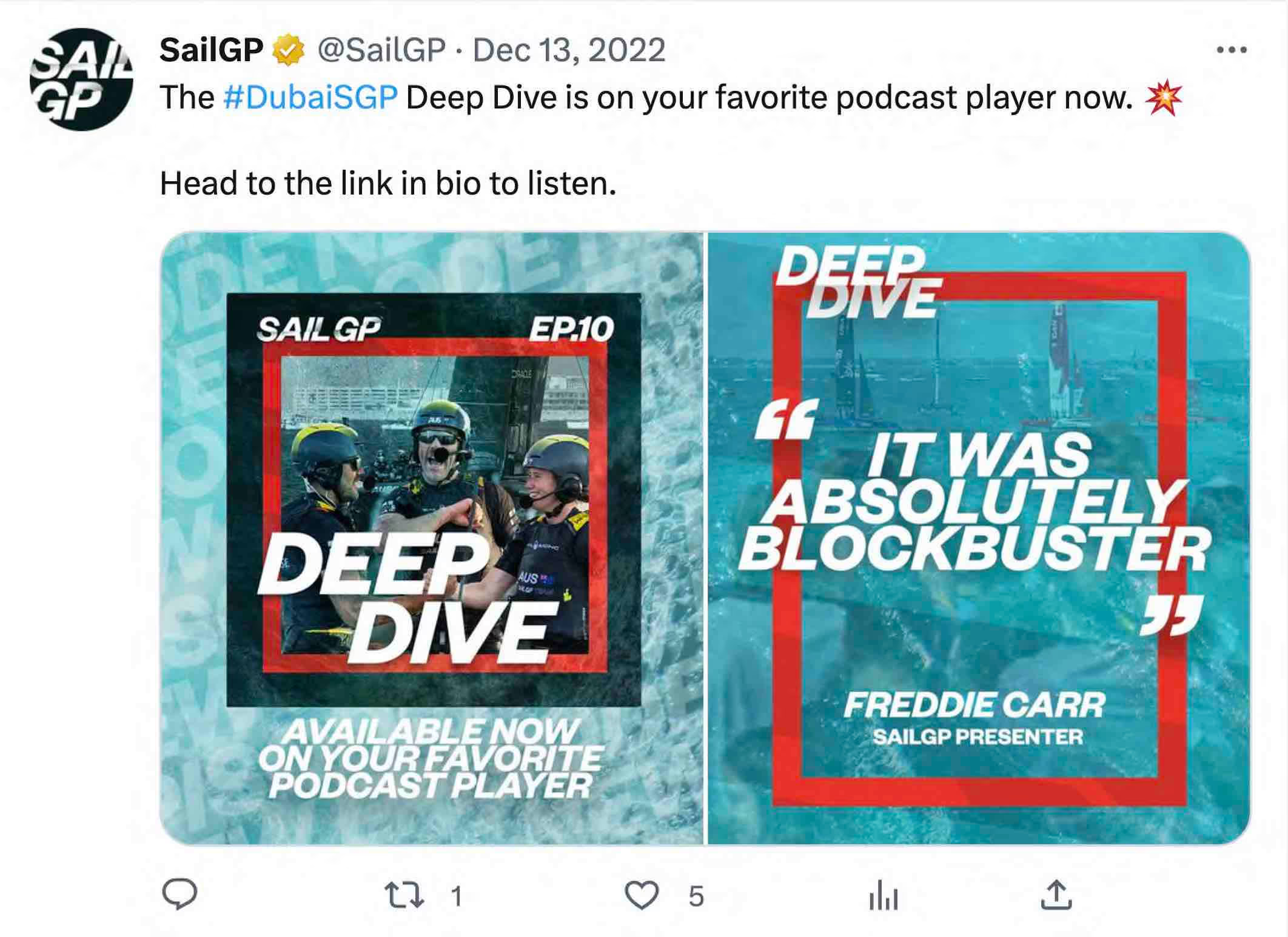
Amy Woods (founder of Content10x) recently spoke to us over at Podcast.co regarding the effectiveness of content repurposing. She said:
If brands can repurpose their audio content to start conversations on social media, they’ll fuel engagement on each platform. And it could actually account for a post a day. It doesn’t take that much extra time or brain effort to do, because they’ve already done the hard work making the episode.
Creating and producing any podcast takes a lot of time, skill, resource, and monetary investment. So it’s important to weigh up whether you think the potential benefits above are worth it for you or your brand, team, or event.
That being said, it’s clear to see how the sports industry can benefit from podcasting. And it’s evident why a podcast content strategy should be considered in any sports brand’s marketing plan. Doing so can hugely impact your business objectives - whether the goal is to boost revenue, increase brand exposure, or make one of your athletes a household name.
Sports podcasts are the perfect tool to do all of the above. We hope that came across in the above article, and we hope the integrated case study helped you decide if a sports podcast is the right next step for your brand.
If you'd like to hear how the team at Cue can help your organisation start a podcast, click here.



Join our carefully curated newsletter packed with insights, tips and resources to help shape and share your stories.